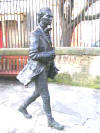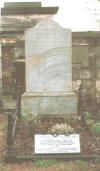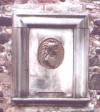|
Three
Roberts and Clarinda
The ancient
Canongate Kirk was built in 1688 with funds left by Thomas
Moodie of Edinburgh who intended it to be an additional
place of worship for the people of the Burgh of Canongate.
Nearby is the older Canongate Tolbooth built in
1591 which served many needs as the Council House,
courtroom and a jail – the latter until 1818. Both
the Tolbooth and Kirk of the Canongate were used
to hold prisoners from the Battle of Prestonpans in 1745.
Steeped in history, the Canongate Kirk Yard is notable for
the coming together of three of Scotland’s most famous
poets and a notable subject of one of their works. Here we
come upon the three Roberts – Robert Burns, Robert
Fergusson and Robert Louis Stevenson, while Clarinda,
otherwise known as Mrs. Agnes McLehose, is subject of
lovelorn letters from Burns.

Robert Fergusson (1751-1774) is not a name that jumps out
at you when the poets of Scotland are mentioned. Most
people will instantly speak of Robert Burns as the prime
Scottish poet, yet Burns himself held the young Robert
Fergusson in the highest esteem.
In the
preface to the first edition of his poems, Burns says that
though in many of his pieces he often had Ramsay (Allan
Ramsay 1681 – 1758) and Fergusson in his eye, it was
“….rather with a view to kindle at their flame, than for
servile imitation”.
Burns also
wrote:
“Rhyme I
had given up, but meeting with Fergusson`s Scotch poems I
strung my wildly sounding, rustic lyre, with emulating
vigour.”
Had he
lived beyond the tender age of 23, Robert Fergusson would
have been the natural successor to Allan Ramsay
(1686-1758), another of Scotland’s leading poets who is
notable for founding the first travelling library in the
U.K.
Fergusson
was born in the Old Town of Edinburgh, on September 5,
1751. His parents had come to Edinburgh only two years
previous, where Robert’s father, William Fergusson, worked
as a solicitor’s clerk. Young Robert was, it seems, of
delicate health but also high spirited and popular among
the students at St. Andrews University.
It was here that he began writing poetry, but it was not until he began writing in the Scottish idiom about the people and places of the Old Town that his popularity was evident. The tale is related of his friendship with Thomas Sommers, a glazier with premises near where Fergusson worked in Parliament Close. One day he called in to see his friend but finding him gone out he left the message :-
“Tom Sommers is a gloomy man
His mind is dark with sin,
O Holy —- ! glaze his soul,
That light may enter in.”
Fergusson`s fame came too late as he suffered from depression which was worsened by a fall and injury to his head. Fergusson
was admitted to the public asylum, where he died on
October 16, 1774. When Robert Burns arrived in Edinburgh
in 1786, one of his first tasks was to go to the Canongate
Kirk to pay his respects at the graveside of Robert
Fergusson. Finding the grave unmarked he paid for the
erection of a memorial stone and composed a short verse to
be inscribed thereon:
” No
sculptur’d marble here, nor pompus lay,
No storied urn nor animated bust;
This simple stone directs pale Scotia’s way
To pour her sorrows o’er her poet’s dust.”
 On On
the other side of the stone is: “By special grant of
the managers to Robert Burns, who erected this stone, this
burial place is to remain forever sacred to the memory of
Robert Fergusson.”
Shortly
after making the arrangements for the tombstone Burns
penned another verse which he wrote under the portrait of
Robert Fergusson in a volume of that poets works that was
being presented to a young lady in Edinburgh March 19
1787:
“Curse
on ungrateful man that can be pleased
And yet can starve the author of the pleasure!
O thou my elder brother in misfortune,
By far my elder brother in the muses,
With tears I pity thy unhappy fate!
Why is the bard unpitied by the world,
Yet has so keen a relish of its pleasures?”
Not far
from the Canongate Kirk is the Calton cemetery where lie
the ashes of the grandfather, uncle and parents of the
third Robert in our tale, Robert Louis Stevenson (1850 –
1894). He too was an
 admirer admirer
of Robert Fergusson and planned to renovate the tombstone
and add an inscription, but died before he could do so. A
modern plaque now fulfils his wish.
“This
stone originally erected by Robert Burns has been
repaired at the charge of Robert Louis Stevenson and is
by him rededicated to the memory of Robert Fergusson as
the gift of one Edinburgh lad to another.”
Clarinda
was the pen name of Mrs. Agnes McLehose of whom Burns
wrote in a letter to his friend, Richard Brown, on
December 30, 1787:
“Almighty love still reigns and revels in my bosom and I
am at this moment ready to hang myself for a young
Edinburgh widow…”
 Born Born
Agnes Craig , Clarinda was the same age as Burns and not
in fact a widow, although living apart from her husband
who had plantations in the West Indies. She was said to be
a voluptuous beauty with a lively manner, witty with a
poetic bent, she was just the right type of woman to
fascinate Burns.
Between December 1787 and the summer of 1794 he
corresponded with Clarinda using as his pseudonym
“Sylvander”. Much has been read into the correspondence
and perhaps some misrepresentations made, but it would
seem that the letters were essentially flirtatious and
sentimental.
Some 25 of
Robert Burns “Letters to Clarinda” have been published and
make fascinating reading while demonstrating the
courtesies and manners of the late 18th century. In
February, 1837, when nearly eighty years of age, Clarinda
still had pleasant memories of their correspondence. She
lies in Canongate Kirk with a plaque above that merely
says, “Clarinda”. Possibly the most remembered of Burn’s
lines to Clarinda must be:
“Ae
Fond kiss, and then we sever
Ae fareweel, and then for ever!”
and the
four lines of the second verse
“Had we
never lov`d sae kindly
Had we never lov`d sae blindly,
Never met – or never parted
We had ne`er been broken hearted”
|